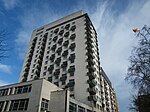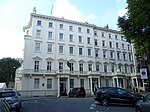Embassy of Denmark, London
Arne Jacobsen buildingsBuildings and structures in the Royal Borough of Kensington and ChelseaDenmark politics stubsDenmark–United Kingdom relationsDiplomatic missions in London ... and 7 more
Diplomatic missions of DenmarkGovernment buildings completed in 1977Government stubsInternational style architecture in EnglandKnightsbridgeLondon building and structure stubsModernist architecture in London

The Embassy of Denmark in London, or formally the Royal Danish Embassy, is the diplomatic mission of Denmark in the United Kingdom. It occupies a large, modern building designed by Danish architect Arne Jacobsen which it shares with the Embassy of Iceland, completed in 1977. The Royal Danish Embassy houses the Danish-UK Chamber of Commerce founded in 1989, and also hosts the Representation of the Faroes in London since 2002.In 2006 there were protests outside the embassy following the Jyllands-Posten Muhammad cartoons controversy; a number of people were later arrested in connection with the protest.
Excerpt from the Wikipedia article Embassy of Denmark, London (License: CC BY-SA 3.0, Authors, Images).Embassy of Denmark, London
Hans Street, London Chelsea (Royal Borough of Kensington and Chelsea)
Geographical coordinates (GPS) Address Nearby Places Show on map
Geographical coordinates (GPS)
| Latitude | Longitude |
|---|---|
| N 51.4978 ° | E -0.1594 ° |
Address
Embassy of Iceland
Hans Street
SW1X 0NJ London, Chelsea (Royal Borough of Kensington and Chelsea)
England, United Kingdom
Open on Google Maps










